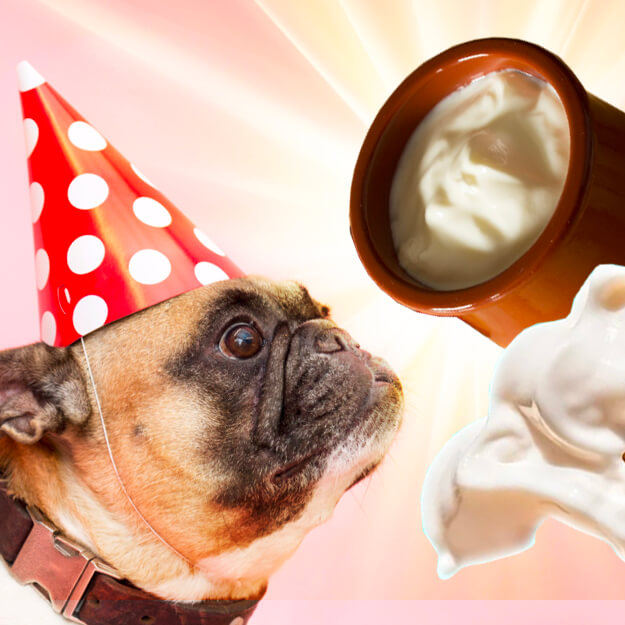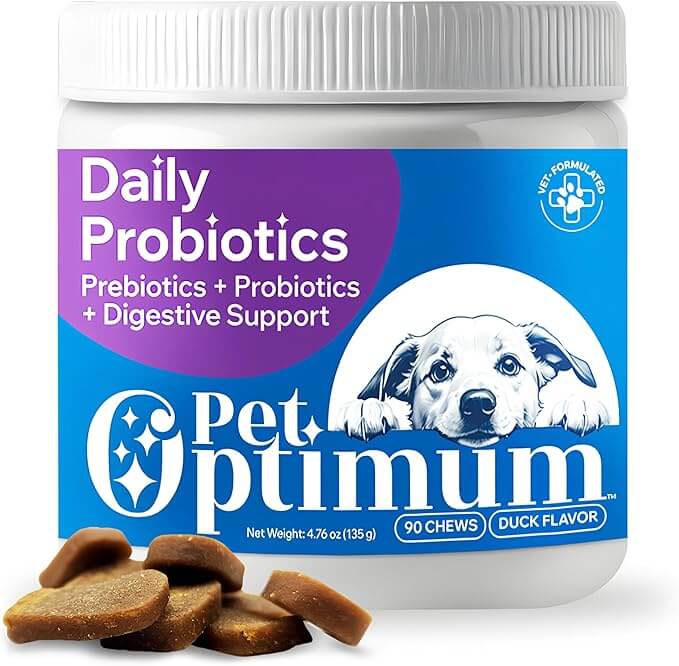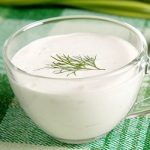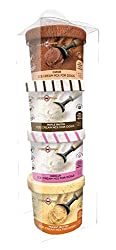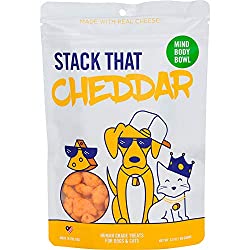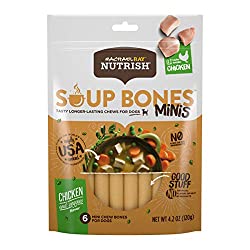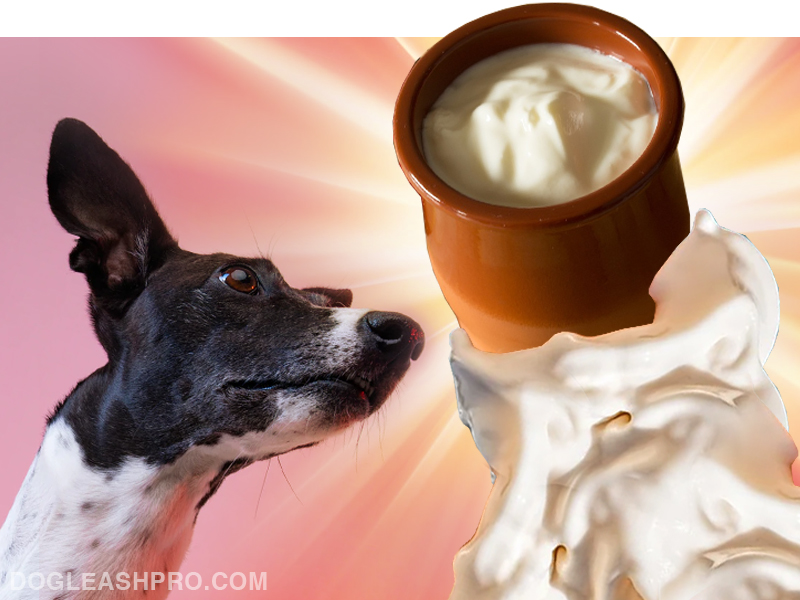
Can dogs eat Sour Cream? Yes, dogs can eat Sour Cream in moderation if they are not lactose intolerant. Healthy dogs can consume Sour Cream as a rare occasional treat. In fact, most dogs absolutely love Sour Cream and will go after it with a passion! Sour Cream is sometimes used during dog training as a reward because dogs love it so much.
While your dog can eat Sour Cream, should they? It’s crucial to feed your furry friends food that meets their nutritional and dietary needs. But sometimes even the best dog food is not enough to satisfy them, especially when they have their eye on what their humans are eating.
Feeding your furry companions food that’s meant for humans should be done infrequently and always in moderation. Before feeding anything to your pooch, research the food first. When done properly, Sour Cream can be a nice little treat but much like cheese balls and cheese puffs, Sour Cream can cause digestive issues such as bloating and gas for your pup.
To help alleviate these digestive issues and promote overall gut health, consider adding a probiotic supplement to your dog’s diet. PetOptimum Probiotics for Dogs are specially formulated to support your pup’s digestion, reduce bloating, and improve nutrient absorption. These tasty chews can also make a great addition to your pet’s routine.
Table of Contents
What is Sour Cream?
Here’s everything you need to know about Sour Cream. It starts as regular cream and then the acetic acid bacteria is added to the cream. When this happens, the bacteria convert the cream’s sugar into a distinctive sour taste. This means Sour Cream is a fermented dairy product.
As you’ll learn later, your pup should only consume a moderate amount of Sour Cream because it has high-fat content and it contains ingredients that are not meant for doggy consumption. Both of these reasons (and more!) can cause uncomfortable side effects in dogs.
Helping you decide if your dog can eat Sour Cream
Sour cream isn’t all that bad if your pups consume it in moderation. But each case is different. We will help guide you along to figure out if your dog can eat Sour cream, how much of it, and what alternative food is available to Sour cream.
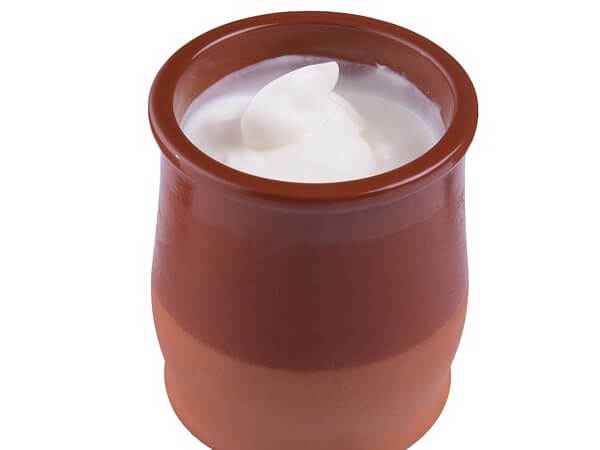
Total Time Needed :
30
Minutes
Total Cost:
25
USD
Required Tools:
Things Needed?
Steps to help you decide if sour cream is safe for your dog:
Can dogs have Sour Cream?
Yes, dogs can have Sour Cream in moderation if they are healthy and not lactose intolerant. In this next section, we’ll discuss how regularly feeding Sour Cream to your canine friends can negatively affect their overall health.
Is Sour Cream bad for dogs?
Yes, Sour Cream can be bad for dogs under these two circumstances.
One way Sour Cream can be bad for dogs is if you know your furry friends are lactose intolerant. Most dogs are lactose intolerant and lack the lactase enzyme that’s necessary to properly break down the sugar found in milk called lactose.
If your pup can tolerate dairy products and has never had Sour Cream before, it’s best to introduce this in a gradual and slow manner. You’ll want to offer just a small amount of Sour Cream and see how they react.
Dogs that react negatively to Sour Cream may be lactose intolerant. They may start to vomit, have diarrhea, pass lots of gas, or bloat. You’ll want to stop feeding them Sour Cream if this is what you’re noticing.
Another reason Sour Cream can be bad for dogs is if your pooch is overweight or on a weight management program. Since Sour Cream has a high-fat content, you’ll want to avoid feeding them this dairy product.
Here is the nutritional profile of just 1 tablespoon (or 12 grams) of Sour Cream:
Nutritional Profile of Sour Cream (1 Tablespoon or 12 grams)
| Name, Unit | Amount |
| Calories, cal | 24 |
| Sugar, g | 0.4 |
| Sodium, mg | 3.7 |
| Carbohydrate, g | 0.6 |
| Total Fat, g | 2.3 |
| Saturated Fat, g | 1.2 |
| Trans Fat, g | 0.1 |
| Polyunsaturated Fat, g | 0.1 |
| Monounsaturated Fat, g | 0.6 |
| Cholesterol, mg | 7.1 |
| Potassium, mg | 15 |
| Protein, g | 0.3 |
This means that just 1 tablespoon of Sour Cream has about 24 calories, 2.3 grams of total fat (1.2 grams saturated), 7.1 mg of cholesterol, and 0.6 grams of carbohydrate (0.4 grams of sugar).
While there are essential minerals, vitamins, and protein in Sour Cream, they’re not enough to provide any health benefit for our furry friends. Additionally, our four-legged friends can receive these nutrients from other canine-friendly food and treats.
The nutritional profile we see above for Sour Cream is enough to let us know that we should not feed our precious pooch this food regularly.
Is Sour Cream safe for your dogs?
Organic Sour Cream is safe if your dog consumes it in moderation. But before you allow them to consume it, find out if your pup is or isn’t lactose intolerant.
Most dogs have trouble digesting dairy products like sour cream because they are lactose intolerant. If your pooch is lactose intolerant, it’s best not to give them any Sour Cream.
If you must, you can give them dairy alternatives like low or non-dairy sour cream. But you should also avoid these products because most vegans and non-dairy sour creams are made with soy or almonds. Soy is a common allergen in dogs and almonds are difficult for your canine to digest properly.
Dogs that aren’t lactose intolerant can have a little bit of Sour cream. You should still be careful with how much you feed your dog. Never give them free rein to eat as much as they like. Start by feeding them a small serving of sour cream and see how they react to it.
Is Sour Cream good for dogs?
Now you must be wondering, “Does Sour Cream provide any nutritional benefit to my dog?”
Overall, sour cream does not provide any major benefits to your dog and should be treated as an occasional treat. While Sour cream contains some calcium and other vitamins and minerals, it is not sustainable for dogs and should not be their main source of calcium.
Building strong bones is important but look for other more long-term food sources that won’t have a negative impact on your dogs’ health. Keep in mind that even if your dog tolerates dairy products, Sour cream is also high in fat.
Let’s discuss when you should not feed Sour cream to your pooch.
When shouldn’t you feed Sour Cream to your dog?
A dog’s body is not designed to digest dairy of any kind after their puppy years (after weaning). Because of this, avoid overfeeding your pooch any dairy products including Sour cream.
During their puppy years, giving them dairy can be a nice nutritional boost. This will allow them to grow into healthy and strong adult dogs. Unfortunately, once this phase of their life has passed it’s probably best to keep the dairy treats to an absolute minimum.
Most dogs have issues with milk and milk-based products, but your personal dog’s lactose intolerance may vary. Some dogs are highly lactose intolerant and this can lead to some unpleasant gastrointestinal issues like diarrhea, vomiting, stomach cramps, and bloating.
Depending on your dog’s level of lactose intolerance your dog may experience mild discomfort, or if lucky experience no downsides to eating their beloved sour cream treat.
Considerations before feeding your dog Sour cream
As noted above, Sour cream contains ingredients that are not suitable for canines. Consuming too much Sour cream can also cause health problems. Here’s what you should be aware of:
High fat content
Sour cream is high in fat. This can cause your pooch to gain weight if they consume too much of it. Obesity in dogs is a serious problem that can lead to other potentially serious health issues. Keep an eye on how much you decide to give your canine friends and adjust based on their health.
Additives in some Sour creams
Not all sour creams are created equal. Some will be low fat, others will be organic, and a few others could still contain additives and sugars. Always keep an eye out for flavored sour creams and make sure they do not contain ingredients or substances dangerous to dogs.
Substances like xylitol (an artificial sweetener) are extremely toxic to dogs, so keep an eye out for sugar-free claims on packaging as these products are more likely to contain artificial sweeteners. Additionally, avoid flavored sour creams especially those that contain chocolate as this is also toxic for dogs.
Possible negative effects of feeding Sour Cream to your dog
Dogs are commonly lactose intolerant, but not every dog has issues with milk to the same degree. Some dogs may be fine while others may experience moderate to severe discomfort after eating any type of dairy.
It’s best to see how sensitive your dog is to lactose by initially feeding them a very small amount of sour cream to see how their stomachs handle it.
If your furry friends show a reaction to the sour cream you can expect to see all or some of the following side effects:
- Loose stool.
- Diarrhea.
- Vomiting.
- Cramps and abdominal pain.
- Bloating.
- Gas.
- Your dog may experience an allergic reaction such as a skin rash.
Dogs and Sour Cream
Can Dogs Eat Sour Cream And Onion Chips?
From personal experience, I strongly advise against giving dogs Sour Cream and onion chips. One evening, I was munching on some and accidentally dropped one. Before I knew it, my dog ate the Sour Cream and onion chip.
Many concerned pet owners will wonder, “Can my dog eat Sour Cream and onion chips?” or “My dog ate Sour Cream and onion chips. What should I do?”
While an occasional chip isn’t likely to cause any immediate harm, it’s best to avoid making it a habit.
Ingredients in these chips may not be suitable for dogs and can cause gastrointestinal upset.
Can Dogs Have Sour Cream And Onion Chips?
No, dogs should not eat Sour Cream and Onion Chips. While some dogs may consume a Sour Cream and onion chip without immediate repercussions, others might have more sensitive stomachs and react differently.
It’s always best to err on the side of caution and stick to dog-friendly treats.
Are Sour Cream And Onion Chips Bad For Dogs?
Yes, Sour Cream and onion chips are bad for dogs. These chips are seasoned with onion powder, which contains thiosulfate.
This compound is harmful to dogs and can cause a condition known as hemolytic anemia if consumed in large amounts.
The high salt content and fats in the chips can also lead to other health issues, making Sour Cream and onion chips bad for dogs.
Will Sour Cream And Onion Chips Hurt Dogs?
While a single Sour Cream and Onion chip might not cause immediate harm to your furry friends, frequent or large amounts can be harmful.
It’s crucial to monitor your K9s if they consume these chips and consult with a veterinarian if you notice any adverse reactions.
Always prioritize your dog’s health and stick to treats designed specifically for them.
Can Dogs Eat Sour Cream And Onion Pringles?
No, dogs should not eat Sour Cream and Onion Pringles. The onion flavoring, even if artificial, can be harmful to dogs.
Onions contain compounds that can lead to hemolytic anemia, a condition where a dog’s red blood cells break down, leaving them without enough cells to carry oxygen.
Can Dogs Have Sour Cream And Onion Pringles?
While an accidental nibble might not lead to an immediate health issue, it’s not a treat suitable for dogs.
The high salt content, artificial flavors, and unhealthy fats in Pringles aren’t beneficial for them.
Sticking with dog-specific treats is always safer and healthier.
Can Dogs Eat Sour Cream and Chives?
No, dogs should not eat Sour Cream and chives. While dogs can eat Sour Cream in moderation (as it’s generally safe), it can be rich. This may upset their stomach if consumed in large amounts.
However, chives are a different matter. Chives, like onions and garlic, belong to the Allium family and can be toxic to dogs.
Ingesting chives can lead to gastrointestinal upset, lethargy, and more severe reactions like hemolytic anemia or organ damage in larger quantities.
It’s best to avoid giving your dog chives or Sour Cream and chives altogether.
Can Dogs Eat Cheddar And Sour Cream Chips?
It’s not advisable to feed your dogs cheddar and Sour Cream chips. These chips are typically high in salt and artificial flavorings, which aren’t suitable for a dog’s diet.
Excessive salt intake can lead to salt poisoning or dehydration in dogs.
Can Dogs Have Cheddar And Sour Cream Chips?
No, dogs should not have cheddar and Sour Cream chips.
While a dog can consume a chip or two without immediate harm, it’s not a recommended treat.
The fats and dairy ingredients in these flavored chips can cause digestive upset or lead to weight gain if given regularly.
It’s best to keep such snacks out of their reach and offer them dog-specific treats instead.
Can Dogs Eat Ruffles Cheddar And Sour Cream?
No, it’s not recommended for dogs to eat Ruffles Cheddar and Sour Cream chips. These chips contain high levels of salt, artificial flavorings, and dairy, which can upset a dog’s stomach.
Additionally, regular consumption can lead to excessive salt intake, which is detrimental to a dog’s health.
It’s best to keep such snacks away from dogs and opt for dog-specific treats.
What if your dog accidentally consumes too much Sour Cream?
It’s important to not leave potentially harmful food open and unattended around your dog, especially if they are a larger breed. Be vigilant and always be present when giving your dog any sort of food not specifically intended for dogs.
If your dog happens to over-consume sour cream, it’s best to not feed them any more treats or human food for the remainder of the day. Instead, give them time to cleanse their system. You can help your canine cleanse themselves by making water available and avoiding feeding them solid food for up to 12 hours depending on how severe their symptoms are.
You can also try a probiotic that’s designed for dog gut health. It may help them deal with any digestive issues caused by over-consuming sour cream.
If symptoms do not clear up within 2 to 3 days and your dog is still experiencing side effects, contact your veterinarian and schedule an appointment.
Moderation is key when feeding Sour Cream to your dog
After you decide your pup can tolerate Sour cream without any serious reactions you can begin to figure out how much of the dairy product you want to give them and how often. Moderation is the key here. Even if your pooch can tolerate it, you should still be careful about how much you are feeding them.
Feed your pooch a minimum amount of Sour cream. A common practice is to give highly moderated foods to dogs during training as rewards on top of standard dog treats.
Your pup’s unique biology and gut flora will determine how much dairy is ok to give. As a responsible and vigilant owner, keep a close eye on your canine companion’s consumption.
Dog Safe Alternatives to Sour Cream
As you now know sour cream is a dairy product that can cause your furry pals some stomach issues if they are lactose intolerant. Luckily, there are some fun and healthy alternatives you can easily make in your home to give them something special and safe to eat.
Here they are:
Organic fat-free plain yogurt
Consider buying some fat-free plain yogurt for your dog instead of Sour cream. Compared with Sour cream, yogurt contains less lactose, has the same general consistency, and tastes very similar.
Yogurt also contains more proteins and has the added benefit of being fermented which makes it an effective probiotic for your dog. Your dog will likely love yogurt just as much as Sour cream and their stomach will be able to tolerate it much better.
Banana mash
Nothing is more natural than bananas. They are loaded with vitamins and minerals and can make a great snack for your four-legged friends.
Simply get some ripe bananas and throw them in a food processor or smash them with a fork until they are soft and creamy. The one thing to keep in mind here is that bananas have sugar so don’t go overboard, feed it to your dog in moderation.
Doggy ice cream
There are specially made products like doggy ice cream which can be a great alternative treat for your dog, especially on a hot summer day. They are made to mimic dairy which your dog will surely love, minus the unpleasant side effects.
Other Products We Recommend:
Here are some dog-safe alternatives for those who are less adventurous in the kitchen but still want to treat their dogs to something special once in a while. These treats have a tangy dairy kick your dog will love.
Conclusion
Sour cream can be a luxurious treat for your dog. When canines see Sour cream, they will get excited and start salivating and wagging their tails. It is important to be aware of the possible downsides of feeding your dog Sour cream. Make sure to keep an eye out for any potential red flags in terms of side effects and reactions.
Moderation is key as with all things. remember your dog is not designed to eat human food and it is your job as a responsible dog owner to shepherd them along and give them exactly what they need.
DISCLAIMER: THIS WEBSITE DOES NOT PROVIDE MEDICAL ADVICE
The information, including but not limited to, text, graphics, images and other material contained on this website are for informational purposes only. No material on this site is intended to be a substitute for professional veterinary advice, diagnosis, or treatment. Always seek the advice of your veterinarian or other qualified health care provider with any questions you may have regarding dietary needs.

With over five years of specialized experience as an animal writer, my expertise lies in dog nutrition, health, behavior, grooming, and training. I am dedicated to delivering helpful and informative content that caters to the well-being of our furry friends. My primary goal is to empower pet owners with knowledge and ensure our canine companions thrive in health and happiness. In my free time, I love volunteering at local dog rescue centers.
